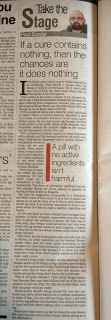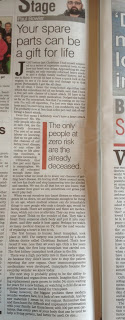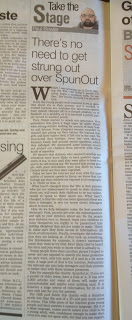The Constitutional Convention recently had to address the issue of marriage equality. It attracted a great deal of attention and submissions. Even I had a go. The Convention ended its deliberations by overwhelmingly voting to recommend steps be taken to facilitate full marriage equality in this country. As expected, the entire process was quickly called into question by the opponents of equality.
While they were lambasting the process for not following its recommendations, the anti-equality think-tank, The Iona Institute, was being criticised for the misuse of a study on family trends. This crass ploy has been loudly and severally commented on. Follow these links, here, here and here to read about what was attempted by Iona.
I don’t wish to add to the quality commentary already made by other bloggers. I want instead, to highlight something that Iona Director and Irish Independent columnist, David Quinn, wrote in his response to being called out for this misuse of data.
I draw your attention to these few lines;
“The available data does not allow us to say how well children raised by same-sex couples fare compared with the biological married family.
It would be invalid, therefore, and a misuse of the Child Trends paper quoted above to pretend the available research shows that children raised by same-sex couples do worse than children raised by their own married, biological parents…
And to this day it remains the case that there are no large national surveys that allows us to draw reliable conclusions about the children of same-sex couples.”
An admission, that at best the only position one can take on marriage equality, if one is to rely solely on the best available data, is one of agnosticism. A remarkable concession for someone from a conservative anti-equality organisation to make. It is a tacit admission, that adopting a homophobic stance, is not a reasoned and scientific decision, reached after much investigation, but a confessional and reactionary position, rooted in the doctrinaire homophobia of the Roman Catholic Church.
Of course this lack of evidence works both ways. Gay couples have not been around long enough, nor exist in large enough numbers, for the kind of definitive studies which get taken seriously by dry academics and disinterested policy-makers. What those of us who are in favour of marriage equality have are, positive small scale studies and a particular view of history that indicate this, is the time to embrace change.
In the liberal democracies of western Europe and the Americas, changes to how we treat the vulnerable have always been incremental and careful. And these changes have consistently had to contend with the forces of inertia, prejudice and vested interest. Fortunately progress continues to be made.
Children no longer work down mines in horrible conditions. Today, even adults working in mines are afforded a level of safety unimagined a century ago. Women have moved from chattel to being almost equal with men (they still lag behind in financial and political power and continue to lack the kind of physical autonomy men take for granted, but progress to date has been transformative).
Slavery has all but disappeared in our liberal democracies. Where it remains, it is deep underground in the criminal world. Non-whites are legally the equal to white people in every way. Economic power remains centered in white elites, but again, property to citizenship is unquestionably a dramatic advance.
We once discriminated on grounds of religion. For centuries sectarian hate scarred and scoured our lands. Today things are so much better that it is now even safe to be an atheist. Have we achieved a truly secular democracy? No. The various sects still have an inordinate amount of political clout, but step by step, they are being excluded from the lives of those who do not wish to endure their interference.
Gay people have moved from the status of criminals to the cusp of gaining full marriage rights. They suffer rates of mental ill-health and abuse above the rest of us, but increasingly the homophobes who inflict this emotional and physical distress are being faced down.
Again and again the law is changed to demonstrate our growing empathy and humanity. And again and again there are those who rail against this desire to respect the marginalised, to empower the hated, to embrace the other. No study was required to demonstrate that treating another human as property was innately disordered, that is lessened us all. No scientific data is required to show that inhumanity begets inhumanity. No statistics need be examined to show that witless prejudice risks vicious impunity.
Quinn and his ilk have been, for centuries, on the wrong side of history. The narrowness of their vision and the spite they spew is insidious because it can delay and it does wound. But the ultimate demise of this vision of hate is all but assured. He doesn’t have the science, he doesn’t have the numbers, he doesn’t even have the confessional power his Church once wielded. All he has is a desperate and an emotive clinging to a prejudice.
History will not be kind to him, but he has succeeded in one thing. I now feel sorry for him. How could I not? For he has lost.







